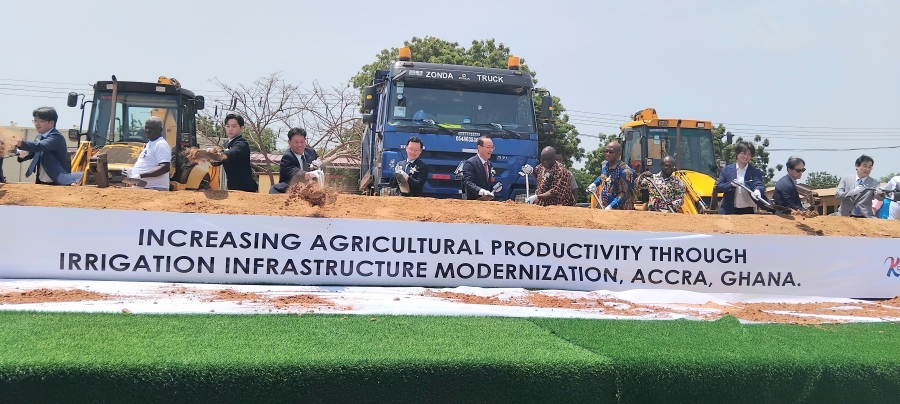The Ministry of Agriculture, Food, and Rural Affairs (MAFRA) in South Korea, in collaboration with the Ministry of Food and Agriculture, Ghana (MoFA), has commissioned 100 hectares of land for the construction of a rice seed cultivation complex at Dawhenya.
The project was officially launched in November 2023 following the signing of a USD $7,800,000 grant agreement between the MAFRA and MoFA in tandem with the Korea Rural Community Corporation and the Ghana Irrigation Development Authority (GIDA) as the administrative implementation bodies for the project.
The project dubbed: “The Project of Increasing Agricultural Productivity Through Irrigation Infrastructure Modernization in Accra, Ghana” is one of the K-Ricebelt programmes seeking to establish a rice seed cultivation complex in 10 African countries, namely Ghana, Senegal, Guinea, Gambia, Cameroon, Kenya, Uganda, Guinea-Bissau, Côte d’Ivoire, and Sierra Leone.
Mr Park Kyong Sig, Ambassador of the Republic of Korea in Ghana, said the Korea International Cooperation Agency (KOICA) was assisting Ghana with USD 28 million this year, while another institution had lent USD 2 billion to the Ghanaian government.
He mentioned that the irrigation facility would enhance rice production tremendously, saying, “We need blood in our body; rice needs water to grow.”
He said the Korea Partnership for Innovation in Agriculture (KOPIA), which handed over 330 tonnes of high-yielding rice seeds to the MoFA, would share knowledge on how to grow the seeds and provide materials needed for the project.
The Korea ambassador called for commitment from the farmers to boost rice production in the country for both importation and local consumption.
Mr Yaw Frimpong Addo, the Deputy Minister of Food and Agriculture, said the project fits into phase two of the Planting for Food and Jobs initiative and would complement the government’s efforts to promote food security in the country.
Mr Frimpong added that the expansion of the irrigation facility to use solar powered pumps to pump water into the farms would reduce the cost hitherto incurred to pump water to the farms and would therefore put smiles on the faces of the farmers.
He urged the farmers to make good use of the seeds that would be provided to them so that other farmers too would benefit from the project, adding that ensuring the project’s sustainability would ensure an annual budgetary allocation even before the project ends.
Mr Lee Sang Jun, the Director of K-Ricebelt, said the Korea once received food assistance but attained complete self-sufficiency in rice production in 1977, saying that his outfit would help improve food security in countries that consume rice through the project.
He said MAFRA plans to contribute massively to the improvement of Ghana’s rice value chain by producing high-quality seeds and providing effective seed distribution to the local farmers.
He said the ministry aims to increase the incomes of local farmers by continuing to cooperate with the government of Ghana to make the initiative successful, explaining that the project would serve as a starting point for the agriculture cooperation between the two countries.





































